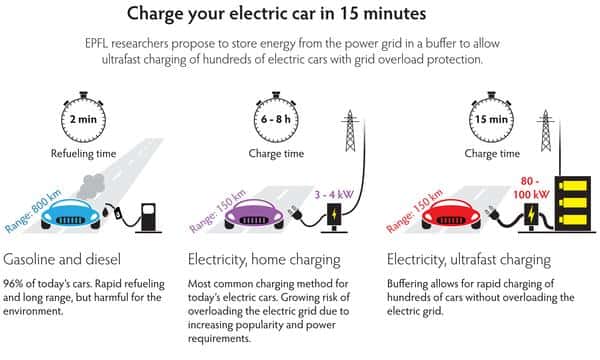EPFL researchers claim to have found the solution to fast-charging electric vehicles (EVs) without bringing down the power grid: intermediate storage.
“We came up with a system of intermediate storage,” says Alfred Rufer, a researcher in EPFL’s Industrial Electronics Lab. “With this buffer storage, charging stations can be disconnected from the grid while still providing a high charge level for cars.”
EPFL says this can be done using the low-voltage grid (used for residential electricity needs) or the medium-voltage grid (used for regional power distribution), which reduces the required investment.
Intermediate storage is achieved using a lithium-ion battery the size of a shipping container, which is constantly charging at a low level of power from the grid. When a car needs a quick charge, the buffer battery promptly transfers the stored electricity to the vehicle. The grid is not even used.
To prove the system works, the researchers at the EPFL Energy Center and Industrial Electronics Lab built a demonstrator together with their partners from the Swiss Federal Laboratories for Materials Science and Technology, the Swiss Federal Institute of Technology in Zurich and the Bern University of Applied Sciences.
The demonstrator is a trailer holding the intermediate storage battery. It draws power from the low-voltage grid and, in the space of 15 minutes, provides the 20 kWh to 30 kWh needed to charge a standard electric car battery. “Our aim was to get under the psychological threshold of a half hour. But there is room for improvement,” says Massimiliano Capezzali, deputy director of the EPFL Energy Center.
EPFL says a station able to quickly charge 200 cars per day would need an intermediate storage capacity of 2.2 MWh. This is the same order of magnitude as the energy consumed by one home in one year. In volume terms, it corresponds roughly to four shipping containers.
“Electric cars will change our habits. It’s clear that, in the future, several types of charging systems – such as slow charging at home and ultra-fast charging for long-distance travel – will co-exist,” says Capezzali.







